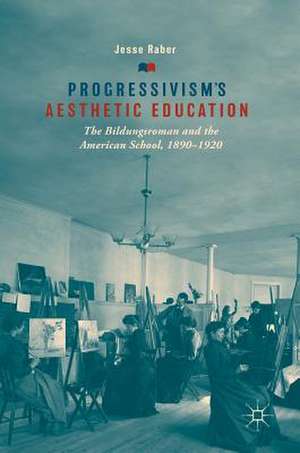Progressivism's Aesthetic Education: The Bildungsroman and the American School, 1890–1920
Autor Jesse Raberen Limba Engleză Hardback – 12 iul 2018
| Toate formatele și edițiile | Preț | Express |
|---|---|---|
| Paperback (1) | 381.81 lei 6-8 săpt. | |
| Springer International Publishing – 20 dec 2018 | 381.81 lei 6-8 săpt. | |
| Hardback (1) | 499.26 lei 6-8 săpt. | |
| Springer International Publishing – 12 iul 2018 | 499.26 lei 6-8 săpt. |
Preț: 499.26 lei
Preț vechi: 587.37 lei
-15% Nou
Puncte Express: 749
Preț estimativ în valută:
95.54€ • 99.14$ • 79.86£
95.54€ • 99.14$ • 79.86£
Carte tipărită la comandă
Livrare economică 15-29 martie
Preluare comenzi: 021 569.72.76
Specificații
ISBN-13: 9783319900438
ISBN-10: 3319900439
Pagini: 218
Ilustrații: XI, 208 p.
Dimensiuni: 148 x 210 mm
Greutate: 0.42 kg
Ediția:1st ed. 2018
Editura: Springer International Publishing
Colecția Palgrave Macmillan
Locul publicării:Cham, Switzerland
ISBN-10: 3319900439
Pagini: 218
Ilustrații: XI, 208 p.
Dimensiuni: 148 x 210 mm
Greutate: 0.42 kg
Ediția:1st ed. 2018
Editura: Springer International Publishing
Colecția Palgrave Macmillan
Locul publicării:Cham, Switzerland
Cuprins
1. Introduction: Progressivism’s Aesthetic Education.- 2. The Doctrine of Interest: Abraham Cahan and the Herbartians.- 3. The Classroom Démueblé: Willa Cather and Maria Montessori.- 4. Herland and Zond: Charlotte Perkins Gilman and the Social Efficiency Educators.- 5. Living Has Its Own Intrinsic Quality: John Dewey’s Aesthetic Education.
Recenzii
“Raber makes a compelling argument for reexamining pedagogical approaches, particularly as related to aesthetic works, and for valuing humanities studies in today’s educational system, issues that will be of interest to Legacy’s readers in academia who are both scholars and educators.” (Julia P. McLeod, Legacy, Vol. 37 (1), 2020)
“There is much to admire and learn from in Raber’s erudite study, which nonetheless addresses too many discrete phenomena coordinated with one another too loosely to result in a cohesive, convincing argument.” (Frederick Wegener, American Literary Realism, Vol. 52 (3), 2020)
“There is much to admire and learn from in Raber’s erudite study, which nonetheless addresses too many discrete phenomena coordinated with one another too loosely to result in a cohesive, convincing argument.” (Frederick Wegener, American Literary Realism, Vol. 52 (3), 2020)
Notă biografică
Jesse Raber teaches English at the School of the Art Institute of Chicago, USA.
Textul de pe ultima copertă
During the Progressive Era in the United States, as teaching became professionalized and compulsory attendance laws were passed, the public school emerged as a cultural authority. What did accepting this authority mean for Americans’ conception of self-government and their freedom of thought? And what did it mean for the role of artists and intellectuals within democratic society? Jesse Raber argues that the bildungsroman negotiated this tension between democratic autonomy and cultural authority, reprising an old role for the genre in a new social and intellectual context. Considering novels by Abraham Cahan, Willa Cather, and Charlotte Perkins Gilman alongside the educational thought of John Dewey, the Montessorians, the American Herbartians, and the social efficiency educators, Raber traces the development of an aesthetics of social action. Richly sourced and vividly narrated, this book is a creative intervention in the fields of literary criticism, pragmatic philosophy, aesthetic theory, and the history of education.
Caracteristici
Brings together the fields of intellectual history, bildungsroman criticism, the history of education, and philosophy Draws upon rarely-used archival sources on educational theory Reconsiders pragmatist aesthetics with a new emphasis on the role of cultural authority within a democratic community One of the first books to include not just American novels, but also American intellectuals, in the theory of the bildungsroman
